 |
 |
 |
 UCSD's Center for Human Development (CHD) receives NICHD grant to create a new "Innovative Research Hub" UCSD's Center for Human Development (CHD) receives NICHD grant to create a new "Innovative Research Hub"
TDLC seed money partially-funded the pilot work
The National Institute of Child Health & Human Development (NICHD) recently issued a Request for Proposals to establish new Learning Disabilities "Innovative Research Hubs" focusing on understudied populations or issues. UCSD's Center for Human Development (CHD) responded and were awarded funding for a new Hub focusing initially on high risk for mathematics failure. This is especially exciting because TDLC "seeded" the grant by funding some of the pilot work that was featured in CHD's proposal to NICHD.
|
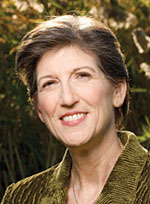 TDLC's Paula Tallal named an Inventor of the Year by the New Jersey Hall of Fame! TDLC's Paula Tallal named an Inventor of the Year by the New Jersey Hall of Fame!
Paula Tallal is being honored because of her "academic and clinical expertise in neuroscience research and the resulting FastForword series of products, which has benefited children across the globe."
|
|

|
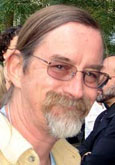 Highlight: Highlight:
Toward optimal learning dynamics
Garrison W. Cottrell and the Temporal Dynamics of Learning Center
TDLC's Co-director, Gary Cottrell, was asked to write a one-page description of some of the best work out of our Science of Learning Center for a workshop in Washington, where all the Science of Learning Centers and some distinguished guests will be discussing what we have learned in the last 9 years of the program. He was asked to list two major discoveries and two challenges.
What We Know About Spike-Timing-Dependent Plasticity (STDP)
Review by TDLC Investigator Feldman is featured in Neuron (8/23/12)
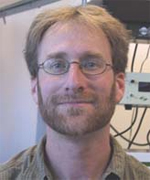
What is Spike-Timing-Dependent Plasticity (STDP) and what is our current understanding of STDP?
It has been 15 years since the discovery of STDP, which has become a leading candidate mechanism for information storage and learning in the nervous system.
TDLC investigator Dan Feldman has written a review in Neuron that summarizes our current understanding of STDP, from its varied forms and cellular mechanisms to theoretical properties and to the evidence that it contributes to plasticity and learning in vivo. Read the abstract 
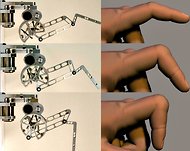 A Robot With a Reassuring Touch (September 18, 2012) A Robot With a Reassuring Touch (September 18, 2012)
Research by TDLC's Javier Movellan and Emanuel Todorov is featured in the New York Times! Read the article 
Image: Alex Simpkins and Mike Kelley
Making San Diego a Hub for Developmental Cognitive Neuroscience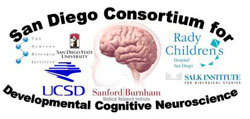
A group of neuroscientists recently gathered for the Inaugural Symposium for the San Diego Consortium for Developmental Cognitive Neuroscience on November 29, 2012.
The event, co-sponsored by TDLC, along with UCSD Deptartments of Neurosciences and Psychiatry, was planned to kick off a newly created group -- The San Diego Consortium for Developmental Cognitive Neuroscience. The inaugural meeting was co-organized and moderated by TDLC's Dr. Paula Tallal. The distinguished speakers included TDLC's Rusty Gage, Andrea Chiba, Tim Brown and Terry Sejnowski, who spoke to a standing room only audience. The inaugural symposium and poster session attracted over 150 participants from San Diego's academic institutions as well as industry demonstrating the broad interest in the topic of developmental cognitive neuroscience.
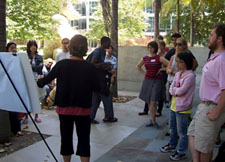 Trainee and Fellow Education and Development Highlights Trainee and Fellow Education and Development Highlights
Presented at the National Science Board Site Visit of Sept. 2012
TDLC's Christopher Kanan and Linda Salamanca presented a poster at the recent National Science Board Visit (Sept. 19, 2012) which highlights various opportunities for TDLC Trainees and Fellows. Included are the following events:
- The Fifth Annual iSLC Conference at TDLC (Apr. 21-23, 2012),
- TDLC Training Grants
- Fellows Lecture Series and Retreat, and
- The Summer Fellows Institute (SFI) of Aug. 6-18, 2012.
Click here to see the poster.
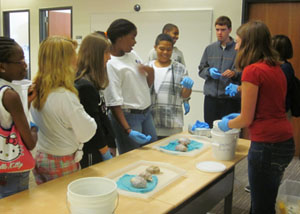 Reach for Tomorrow 2012 Reach for Tomorrow 2012
TDLC has a longstanding commitment to K-12 education, with well-established outreach efforts directed towards educators, students, and parents. The Center takes particular pride in working with communities underrepresented in the STEM fields (Science, Technology, Engineering, and Mathematics). Not only are these students less likely to have access to the resources necessary to fulfill their academic goals, but they are more likely, under the circumstances, to have lower expectations, and often by the time they reach middle school, these youngsters have abandoned their dreams and have surrendered to the notion that a post-secondary education just isn't in the cards for them. This doesn't necessarily mean that these students aren't optimistic about their futures, but that they expect a little less of themselves. To reach out to these students, TDLC partners with groups and organizations that have a well established track record in K-12 outreach.
Summer Fellows Institute (SFI) 2012
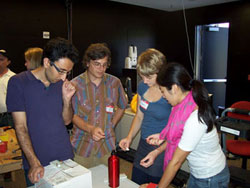
With well over 100 Center trainees (students and postdoctoral scholars advised and mentored by our investigators), TDLC is committed to advancing their careers by providing resources for research, including project funding and assembling an extensive network of colleagues with whom to collaborate. However, for those among them seeking formal training in TDLC's primary research areas, there is the Summer Fellows Institute (SFI). The SFI (affectionately referred to as "bootcamp") is a unique, full-time two-week program hosted by the Center on the campus of UC San Diego. Held August 6 - 18, the SFI offered instruction to 19 trainees from TDLC and two other NSF Science of Learning Centers: the Spatial Intelligence and Learning Center and the Visual Language and Visual Learning Center. More
|
|
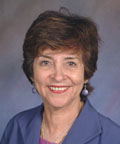 Colorado Distinguished Educator Panel Colorado Distinguished Educator Panel
Held First Meeting
Colorado's Distinguished Educator Advisory Panel (DEAP) met for their inaugural meeting on September 29 at the University of Colorado Boulder. Michael Mozer hosted the group and Gary Cottrell and Andrea Chiba welcomed the group to TDLC via Skype. The present members are educators from the Highlands Ranch and Aurora area but other educators from other districts including Boulder Unified will join us in January when we meet for our second event. |
|
 |
 Featured Scientist: Featured Scientist:
Isabel Gauthier, TDLC Investigator
Email: isabel.gauthier@vanderbilt.edu
"What has your research revealed about sex differences in object recognition?"
We recently designed a new measure of performance in object recognition and even though it was not the goal of the project, we found that women were better than men with some categories of objects (mushrooms, birds, butterflies, leaves) and the reverse was true for other categories (cars, planes and motorcycles). Note that in our study, women also outperform men on face recognition, and that's a result that is not uncommon in research that we have surveyed.
When psychologists find sex differences in ability, an obvious question is where they come from. And our work was not designed to answer this question. We do believe that the mechanisms in the brain that support object recognition are the same in men and women, or at least we have no reason to think they are not. It is therefore likely that what explains these differences is experience with different categories of objects. It is easy to imagine that more of the men we tested had spent a lot of time reading car magazines, and that women spend more time reading magazines full of faces, but even then we might ask why women and men have somewhat different interests? The role of culture is likely extremely important, and there may be some biological predispositions too, as suggested by some work in which monkeys of both sex were given stereotypical toys like dolls and trucks and animals spent more time with sex-congruent toys.
But it is important to understand that finding a sex difference in an experiment can have important implications beyond the question of their origins. Here, for instance, we demonstrate that the common strategy of measuring basic object recognition skills with a single category just does not work, because people vary in their experience with categories. So even if I perform poorly on your test of car recognition, it may not mean that I am poor at object recognition - it may just mean I have never given much attention to cars. Measuring abilities in object recognition in the best possible way is becoming an important goal of our research within TDLC, as we increasingly believe that these abilities may predict how well a person can learn to perceive objects that are critical for performance in a variety of situations, from studying biology in school to learning how to play chess.
These results were published online in the Vision Research journal (article: The Vanderbilt Expertise Test Reveals Domain-General and Domain-Specific Sex Effects in Object Recognition). Click here to read more!  |
|
This message was sent from:
The Temporal Dynamics of Learning Center (TDLC.UCSD.EDU)
University of California, San Diego,
9500 Gilman Drive, La Jolla, CA 92093
To learn more about TDLC, please visit us on the web at: TDLC.UCSD.EDU
Please contact webmaster@tdlc.ucsd.edu to unsubscribe.
TDLC is a Science of Learning Center (SLC),
one of six SLCs funded by the National Science Foundation. NSF grant #SBE-0542013
|
|
 |
 |
 Nov/Dec 2012 Nov/Dec 2012
|
 |
Contact Us |
 |
TDLC Website |
 |
About TDLC |
Upcoming Events
|
 |
All Hands Meeting 2013
Dates: Feb. 8-9, 2013
|
 |
Annual iSLC Meeting
Dates: Feb. 21-24, 2013
Philadelphia Loews Hotel |
|

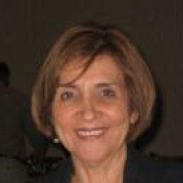
TDLC's The Educator Network
Recent
Forum Topic:
Brain scans predict Children's Reading Ability
"Scientists at Stanford University identified new research that showed that brain scans can identify neural differences in children that could potentially have reading difficulties later in life. The findings, they say, could influence the kind of reading lessons that could be administered to pre-elementary students who show such differences. While the study was small, (39 children), they found that these neural differences did predict their test scores over the 3-year period." Click here for the article.
|
|
|
 |
 |
This is your brain on exercise
(NBC News, Vitals)
Seniors who fit in the most daily physical activity can have more gray matter in important brain regions, researchers report.
Read article 
|
 |
Scientists See Promise in Deep-Learning Programs
(The New York Times, Nov. 23, 2012)
Read article 
|
 |
Just a Little Meditation Causes Brain-Wave Changes
(Psychological Science, Nov. 2012)
Read article 
|
 |
Brain Scientists Uncover New Links Between Stress And Depression
(Health News from NPR)
Read article 
|
 |
Brain-controlled helicopter takes mental concentration to new heights
(CNN Tech, Nov. 2012)
Makers say toy enhances ability to concentrate
Read article 
|
 |
Host Ira Glass talks about his experiences reporting on education and the unending question of how we can make schools better
(This American Life)
Listen 
|
 |
Scientists Report Promising New Direction for Cognitive Rehabilitation in the Elderly
(Science Daily)
Read article 
|
 |
Robot mimics infants' word learning
(Los Angeles Times)
"Researchers build it to learn simple vocabulary just by having a conversation with a person, in work that sheds light on how babies learn to talk."
Read More
|
 |
Unable to speak, a few can now write with their eyes
(The Body Odd, NBC News)
"A researcher in France taught people to write with their eyes, making it possible for people who lost the ability to speak to communicate again."
Read More
|
 |
The aging brain: Why getting older just might be awesome
(CNN Health)
Research explains several ways in which the brain actually improves with age.
Read More
|
 |
How far back can you remember? When earliest memories occur (NBC News)
Read More
|
 |
Robot learns to track itself and the world through a mirror
(NBCNews.com)
"A robot at Yale has passed an important milestone of self-awareness by inferring information about the real world by observing it through a mirror."
Read More
|
 |
To boost memory, shut your eyes
(CNN Health)
"When you really need new information to sink in, you can't skimp on taking breaks, new research suggests."
Read More
|
 |
Scientists See Promise in Deep-Learning Programs
(The New York Times, Nov. 23, 2012)
Read article 
|

|
Can chocolate in moderation be good for you?
Dr. Beatrice A. Golomb, MD, PhD (Professor of Medicine at UCSD) presented a seminar at the UCSD Library, discussing the benefits of chocolate. She described how chocolate, rich in "phytonutrients" and antioxidants, has been shown in research to "produce favorable associations to blood pressure, blood sugar regulation, cholesterol profiles, heart disease, cognitive function" and possibly even dental cavities. Of course, this is all when eaten in moderation! More ...
(reference:
New York Times)
|
|
|
 |

![]()
